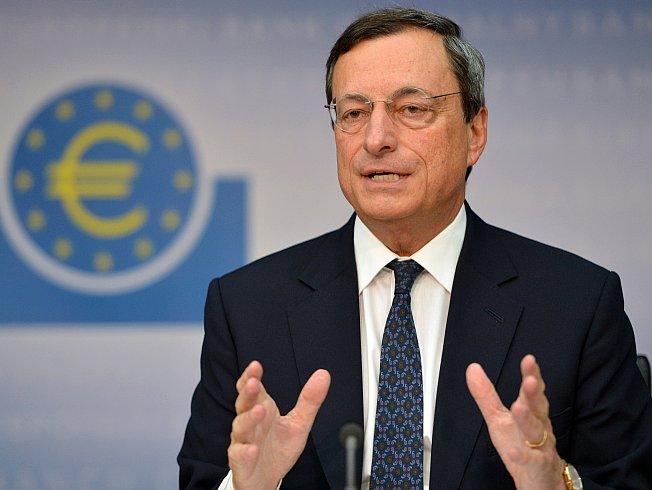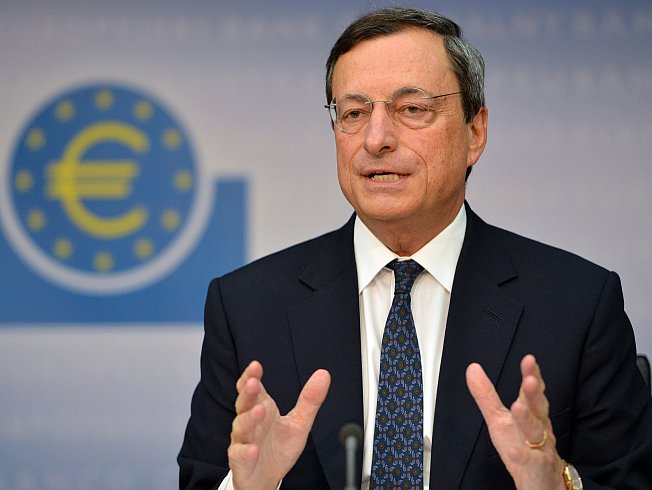Markets reacted exuberantly as the European Central Bank’s President Mario Draghi announced Thursday in Frankfurt that there will be “unlimited bond purchases” by the central bank, which oversees the common euro currency.
Judging by the market’s reaction to the central bank’s announcement, the ECB is now taking center stage when it comes solving the debt crisis in Europe and boosting market confidence. While the market hardly moved following recent Fed meetings in the United States, where expectations were high but largely not met, stocks were up across the board Thursday following the ECB’s announcement to buy peripheral bonds—bonds issued by heavily indebted eurozone countries.
The EURO STOXX index closed up 3.4 percent, with Spain outperforming, up 4.9 percent. The enthusiasm in the United States was hardly any less, with both the S&P, up 2 percent, and Dow Jones, up 1.9 percent, posting solid gains and touching levels not seen since December 2007. Gold, which usually reacts positively to central bank balance sheet expansion, lagged stocks by rising 0.6 percent.
Details Unveil Compromise Leaked the Day Before
The high in the stock market comes despite the fact that the details unveiled at the press conference Thursday were largely identical to what had been leaked the day before. In addition, the plan does not encompass some of the earlier market hopes of yield caps on peripheral bonds—a move that would see the ECB buy every bond tendered at a yield higher than that officially designated—and a rate cut to 0.5 percent. The ECB decided to leave its main refinancing rate at 0.75 percent.
The current program, called Outright Monetary Transactions, will be limited to the secondary market and include a substantial catch, as all purchases undertaken to prop up peripheral bonds will be “fully sterilized,” which in the parlance of central bankers means that other bonds—presumably German or Dutch—will be sold, thereby keeping the size of the balance sheet largely unchanged. This explains why gold’s reaction to the announcement was muted.
The purchases will be restricted to the front end of the yield curve—Draghi reportedly said in a private meeting that short-end buying amounts to “very little” monetary financing—including maturities of up to three years. This can be considered an inverse of the Federal Reserve’s Operation Twist, where the U.S. central bank buys longer dated bonds and sells shorter dated bonds, although it is unclear which maturity bonds the ECB will be selling. In this effort, the ECB’s balance sheet will deteriorate in quality—as bonds bought will be of lesser quality than bonds sold—while its liquidity is likely to increase.
The whole operation serves the goal of creating a “fully effective backstop that removes tail-risk from the eurozone” and will “avoid destructive scenarios,” according to Draghi.
Governments Have to Be Officially Bailed Out to Qualify
Another catch is the element of conditionality in the ECB move, again something that is missing from the Fed’s Quantitative Easing or Operation Twist programs. While the Fed takes economic performance and inflation as guidelines and does not make its actions dependent on what the U.S. Congress does with its budget, the new program by the ECB will only be activated if struggling eurozone governments, such as Spain, formally ask for a bailout and comply with conditions set forth by the European Union and likely the IMF.
“[The ECB will make bond purchases] as long as program conditionality is fully respected, and terminate them once their objectives are achieved or when there is noncompliance with the … program,” says an ECB press release dated Sept. 6.
Bundesbank and Some Market Participants Displeased
“In the most recent discussions, as before, Bundesbank President Jens Weidmann reiterated his frequently substantiated critical stance toward the purchase of government bonds by the Eurosystem,” says a press release by the Bundesbank in reaction to the ECB’s decision.
Given that there was only one dissenting voter on the council, it is a safe bet that it was Weidmann, who almost certainly reasserted his position and voted against the policy that in his opinion creates moral hazard and undermines price stability. “[Weidmann] regards such purchases as being tantamount to financing governments by printing banknotes. … If the adopted bond-purchasing program leads to member states postponing the necessary reforms, this will further undermine confidence in the political leaders’ crisis-resolution capability,” says the release.
Other market commentators agree with Mr. Weidmann but did not chose such polite words. Stephen Stanley of Pierpont Securities wrote in a note to clients that the ECB plan resembles a “Classic Banana Republic” and that the program is in effect a wealth transfer from northern to southern Europe, which has “squandered” its wealth. He does admit, however, that the sterilization clause ensures that the program will not be inflationary in the short term.
Mark Grant of Southwest Securities said in an interview on CNBC Thursday that creditor nations such as Austria and the Netherlands will not allow another bailout, which practically means that the ECB “does not have permission to do anything,” due to the conditionality requirement, and that “the whole ECB move is a false one and will never take place.”
The Epoch Times publishes in 35 countries and in 19 languages. Subscribe to our e-newsletter.







